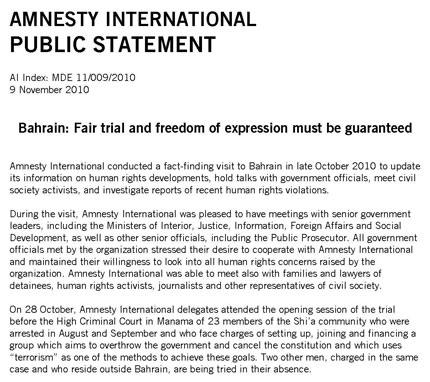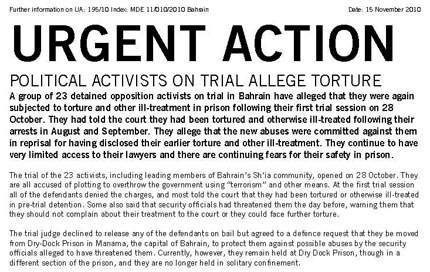
|
 |
 |
|
|
|
|
|
|
|
|
|
|
|
|
|
|
|
|
|
|
|
|
|
|
Amnesty Investigates Torture AllegationsOn 9, 15 and 16 November 2010, Amnesty International (AI) issued three public statements regarding the human rights situation in Bahrain where it expressed deep concerns regarding a number of issues. Due to the importance of these statements, the BHRM relayed the questions posed by AI to the Ministry of Justice and Islamic Affairs, the Ministry of Social Development and the Information Affairs Authority (IAA). So far, the BHRM has received two responses from the IAA and the Ministry of Social Developmen?, but is still waiting to hear from the Ministry of Justice.
The most important issues that were raised in the three statements relate to the case of the 23 detainees, who were arrested according to the anti- terrorism legislation introduced in 2006. AI expressed its deep concern regarding the following: The statement issued on 9 November 2010 stated that “the officials carrying out the arrests are said to have failed or refused to show arrest warrants, in breach of Bahraini law.” The statement also added that “those arrested were initially held incommunicado for some two weeks during which their families and lawyers were not able to establish their whereabouts or gain access to them.” A primary concern for AI is that the detainees informed their lawyers and their families that “they had been tortured or otherwise ill-treated to force them to sign confessions”. However, it also said that the Public Prosecutor referred a number of the detainees to undertake a medical examination. Moreover, the statement gave a detailed account of the 28 November first public session, and the testimonies of the detainees, which included torture allegations.
AI also expressed its concern regarding the detainees’ lack of access to their lawyers, which is a key element of the right to a fair trial as stipulated in the International Covenant on Civil and Political Rights (ICCPR), which Bahrain is a state party, and Article 20 of the Bahraini Constitution. The 9 November statement also highlighted the trial judge’s decision at the end of the first session on 28 October 2010, which included: moving the detainees to a prison under the supervision of the Ministry of Interior, referring a number of detainees to doctors for medical examinations in order to verify the torture allegations, and allow the detainees regular access to their lawyers. According to statement, the defence lawyers claim that torture was still continuing at the time and that they were unable to meet regularly with the defendants in conformity with the trial judge’s order. On 15 November 2010, AI issued an Urgent Action followed by a press statement the following day explaining the matter. Ministry of Justice is Yet to ReplyOn 19 November 2010, the BHRM wrote a letter to the Minister of Justice and Islamic Affairs, H.E. Shiekh Khalid bin Ali Al Khalifa, in which it relayed Amnesty’s concerns, and raised some questions regarding the detainees, in the hope that the Ministry will respond to them. The BHRM hoped to receive the response on time but that was not the case. The BHRM understands the complexity of the case regarding the Public Prosecutors order of 26 August 2010, which prohibited the publication of any information rega?ding the case or the trial. The BHRM is not looking for information that will violate the Public Prosecutors’ order, but only seeks some clarification that can be published without negatively affecting the fairness of the trial or endangering national security. The questions that were raised by BHRM to the Minister of Justice were as follows: ■ The Honourable Judge in the opening session ruled that the detainees should be moved to a prison under the control of the Ministry of Interior, and be allowed to meet with their lawyers for longer periods of time. Also he agreed that the lawyers should be given the file. Were the Judge’s rulings implemented? If not, why? ■ With regards to access to the lawyers by the detainees, how many times did they meet between 28 October and 11 November 2010? ■ How many times were the detainees allowed to see their families, and how long did their visits last? ■ Can you provide us with information about the services inside the prison, including medical, food and contact with the outside world through newspapers and TV? ■ The detainees complained to the Judge that they were subjected to torture between the first and second sessions. They also said that they were tortured between the second and third sessions, in spite of their previous complaint to the Court. Did the Court take any legal measures regarding these torture allegations? If so, what were they? ■ What are the legal assurances for the detainees during their time of detention? The BHRM has not received any reply from the Ministry of Justice, however it obtained some information on the following issues: 1. AI stated that 6 November 2010 was the last time that the lawyers met with the defendants and that the meeting lasted for a short period of time. The information available to the BHRM states that on 14 November 2010, the lawyers were given permission to meet with the defendants on 21 November 2010, in the Dry Dock Prison, but the defence lawyers failed to attend because some of them were abroad, whilst others apologized without specific reasons. 2. During the second session of the trial which took place on 11 November 2010, the trial judge ordered that the defence council be given 22 copies of the file in order to enable them to prepare their defence. 3. According to official sources, some of the torture allegations may be true but these are individual cases and not systematic, which are investigated most of the time. The BHRM obtained information regarding the measures taken against employees in the Ministry of Interior who were involved in the ill-treatment of the detainees. The information is clarified by the table below.
With regards to the torture allegations and the ill-treatment of detainees, the BHRM stressed the necessity to conduct a transparent and independent investigation. The BHRM would like to draw attention to the previous experience regarding similar torture allegations in the Carazcan Case where the judge had ordered the establishment of a medical committee from the Ministry of Health to investigate the torture allegations. The BHRM believes that this experience should be applied to the current situation. The BHRM also believes that the National Institution for Human Rights should play a major coordinative role in such cases in order to find the truth. |
|||||||||||||||||||||||||||||||||||||||||||

